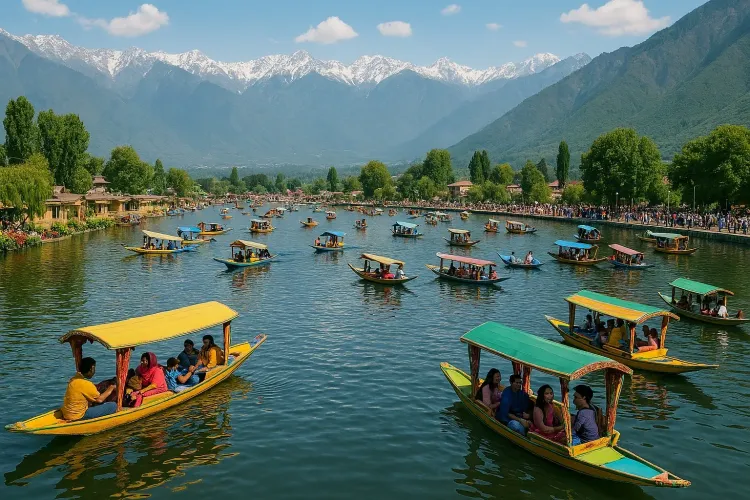What Defines Kashmir’s Transformation After Article 370?

Synopsis
Key Takeaways
- Kashmir is witnessing a significant start-up boom.
- The region is focusing on economic inclusivity and civic empowerment.
- Digital platforms are revitalizing traditional handicrafts.
- Tourism is on the rise with improved infrastructure.
- Educational reforms are underway to promote regional culture.
Srinagar, Aug 4 (NationPress) Six years post the abrogation of Article 370, Jammu and Kashmir is witnessing a comprehensive transformation that challenges its tumultuous history. From a surge in start-ups to a revival of cultural heritage, the region is crafting a fresh narrative grounded in economic inclusivity, infrastructure modernization, and civic empowerment.
Central to this change is the Jammu and Kashmir Start-up Policy 2024-27, unveiled by Lieutenant Governor Manoj Sinha at the Avinya Startup Summit in March 2024. This initiative aims to establish 2,000 start-ups by 2027, with 837 ventures already registered, including 302 led by women.
A Rs 250 crore venture capital fund, backed by an initial investment of Rs 25 crore from the UT administration, has been introduced to stimulate innovation in agri-tech, handicrafts, and digital services.
Kashmir's handicraft sector, long affected by counterfeit imports and market seclusion, is undergoing a digital renaissance. Platforms like Kashmir Box have empowered artisans to connect with global markets.
Recent actions against counterfeit GI-tagged items, including carpets and pashmina shawls, have restored consumer confidence, with traders advocating for more stringent enforcement and public verification processes.
Businesses are flourishing, with a renewed interest in traditional crafts such as Pashmina, Sozni embroidery, and walnut wood carving, many of which now hold GI certification.
Infrastructure development through the Srinagar Smart City Project, sanctioned in 2017 and managed by Srinagar Smart City Limited (SSCL), has transformed urban life with smart roads, sanitation improvements, and digital governance tools.
Tourism is booming, with houseboat owners and heritage guides reporting record bookings, aided by improved connectivity and the beautification of riverfronts like the Jhelum Bund, where a Rs 68.02 crore Detailed Project Report (DPR) has been approved for embankment restoration and ghat illumination.
Since 2019, the region has attracted investment proposals totaling Rs 1.63 lakh crore, with over 8,300 applications received across sectors from hospitality to horticulture. However, actual investments reached Rs 10,516 crore by early 2025.
In rural Kashmir, agri-tech start-ups like Qul Fruitwall, founded by Khuram Mir, are revolutionizing agriculture with IoT-based soil monitoring, drone-assisted crop management, and digital supply chains.
Qul has recently secured Rs 60 crore in global institutional funding and serves over 5,000 farmers. The new domicile law, introduced in 2020, has awarded certificates to over 25,000 individuals, granting them access to land rights, government jobs, and welfare programs.
Educational reforms are also in progress. Kashmiri has been mandated as a compulsory subject in schools up to Class 10, although implementation faces challenges due to a lack of trained educators.
Meanwhile, the University of Kashmir is broadening its curriculum in regional literature and cultural studies, including interdisciplinary research through the Institute of Kashmir Studies and the Centre of Central Asian Studies.
These advancements indicate that Kashmir’s post-abrogation path is not solely political; it is deeply social, economic, and cultural.









